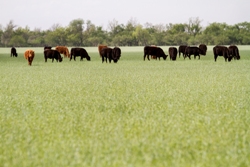
Agricultural News
Kirkpatrick Foundation Publishes The Oklahoma Animal Study
Wed, 16 Mar 2016 12:28:28 CDT

The First Comprehensive Analysis on the Welfare of Oklahoma Animals
The Kirkpatrick Foundation is pleased to announce the unveiling of a three-year project on the state of animal wellbeing in Oklahoma, The Oklahoma Animal Study. More than 1,200 copies of the study are being mailed to policy makers, thought leaders, media, and stakeholders this week. The study is also available online. Co-authored by Kristy Wicker and Manda Overturf Shank, the report details findings on the current status, laws, regulation, care and general wellbeing of companion animals, livestock and farm animals, horses, wildlife, exotic animals, and laboratory animals in the state. The goal of The Oklahoma Animal Study is to provide a summary of the current state of animals in Oklahoma with recommendations based on the findings toward improvement in current conditions.
For several decades, the Kirkpatrick Foundation has responded to a pressing need for increased animal welfare and protection with a commitment to assist through the advancement of knowledge and collaboration. In 2012, the Foundation debuted a twenty-year Safe & Humane initiative with a goal of making Oklahoma the safest and most humane place to be an animal by 2032. The Oklahoma Animal Study will be compared with future assessments to determine progress toward the 2032 goal.
"To our knowledge, in surveying the landscape of animals throughout the U.S., no other geographic area has taken this kind of thorough examination of the conditions of its animals," says Louisa McCune, executive director of the Kirkpatrick Foundation. "Animal welfare is an important indicator of community health. We believe that treating animals well is an important function of society, and we hope governments, businesses, organizations, and individuals will see the merits of this report as we all continue the discussion about improved quality of life."
Under the guidance of McCune and Paulette Black, program officer of the Kirkpatrick Foundation, Kristy Wicker, principal investigator, conducted 114 interviews with stakeholder candidates working in the Oklahoma animal-welfare community to serve as foundational information sources for the study. The interviews were conducted between 2013 and 2015 and included scientists, veterinarians, food-industry specialists, experts in the fields of animal behavior and wellbeing, animal-welfare advocates, and individuals from animal-protection organizations. To reflect the diversity of animal interests, data was also gathered from multiple sources, including shelter surveys, scientific articles, and literature reviews. Manda Overturf Shank, co-author of The Oklahoma Animal Study and program associate for the Kirkpatrick Foundation, analyzed, edited, and fact-checked the document for patterns as well as problems and strengths in the status of Oklahoma animals. The final compilation was reviewed by experts from various animal groups across the U.S.
"What is the condition of animals in Oklahoma? The answer to the question does not come quickly or easily," says Mrs. Shank. "We must take into consideration several factors, including the economy, the political environment, the use of and view toward private and public landownership, and, in general, how Oklahomans in rural and urban settings interact with, view, and respect animals. The short answer is that, in a number of ways, Oklahoma animals are doing both better and not as well as animals in other parts of the nation and world. Animals in rural areas fare less well than those in urban areas. I hope that those reading this report are inspired to learn more, ask questions, and take an active role in improving the wellbeing of Oklahoma animals."
In addition to several specific recommendations, the report generated 12 primary recommendations to improve the current conditions of animals in Oklahoma:
1. Update and enforce various animal statutes, from repealing the pound-seizure law to restoring the statewide ban on horse slaughter and prohibiting the private ownership of dangerous wild animals.
2. Require and facilitate the licensing and inspection of all Oklahoma animal shelters and encourage the development of rural veterinary and shelter services.
3. Discourage the expansion of Concentrated Animal Feedings Operations and educate the public about their effects on human health, animal welfare, and the environment.
4. Encourage and support sustainable and humane agricultural practices and the use of local food distribution cooperatives and humane labeling systems.
5. Advocate for the use of pain alleviation in farm-animal procedures such as castration, branding, and dehorning. Prohibit tail docking.
6. Require horse-racing industry groups to adhere to current rules and laws governing international standards of care.
7. Study the prevalence of and ultimately prohibit dangerous wild animals in Oklahoma private homes, auctions, and breeding facilities.
8. Encourage and fund the development of domestic-violence and homeless shelters that house pets with their owners. Research demonstrates that battered victims delay leaving or return to abusive situations out of fear for the safety of their animals.
9. Support humane education with the placing of animals in schools, shelters, and similar organizations to teach social and emotional learning to children. Teaching the next generation of Oklahomans how to show compassion to all creatures is an essential step in creating a more empathetic society.
10. Further develop and create a statewide emergency animal-response plan; train animal-response teams at the local and state level to effectively and humanely respond to natural disasters, including tornados, fires, and floods.
11. Educate the public about humane and non-lethal forms of wildlife conflict resolution by raising awareness and facilitating access to information and services.
12. Study and educate Oklahomans about (1) the use of canned hunt facilities, (2) inhumane forms of hunting such as trapping and hounding, and (3) inhumane hunting practices at contest kills and rattlesnake roundups.
WebReadyTM Powered by WireReady® NSI
Top Agricultural News
More Headlines...





